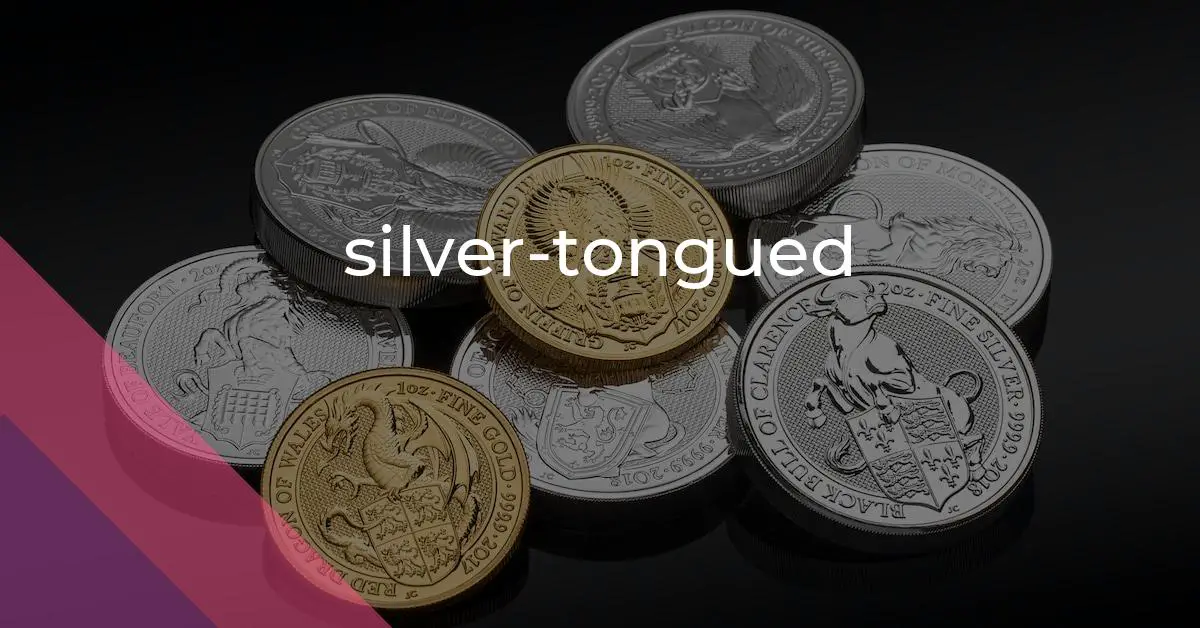silver-tongued: Idiom Meaning and Origin
What does ‘silver-tongued’ mean?
The idiom *silver-tongued* refers to someone who is eloquent and persuasive in their speech. They have the ability to speak in a charming and convincing manner, often using their words to manipulate or influence others.

Idiom Explorer
The idiom "wicked tongue" refers to someone who has a sharp or hurtful way of speaking, often intentionally using their words to criticize or hurt others.
The idiom "spin doctor" refers to a person who presents information, often political, in a way that is favorable to a particular viewpoint or to manipulate public opinion. They use rhetoric and persuasive techniques to shape the narrative, often focusing on positive aspects and downplaying negative ones.
The idiom "speech is silver, silence is golden" means that sometimes it is better to remain silent than to speak. Silence can be more valuable or beneficial than speaking, especially when we need to avoid saying something that may cause harm or create conflict.
The idiom "speak with a forked tongue" means to deceive or lie, often by saying one thing while secretly meaning something else. This expression originated from the image of a snake's tongue split into two, symbolizing deceitfulness.
The idiom "speak to" means to address or discuss a particular issue or topic, often with the intention of expressing an opinion or giving feedback. It conveys the idea of directly engaging with the subject matter in conversation or communication.
The idiom "speak someone's language" means to effectively communicate with someone by using their preferred style or approach, making it easier for them to understand and relate to what is being said.
The idiom "speak one's mind" means expressing one's opinions or thoughts honestly and openly without hesitation or fear of consequences.
The idiom "speak for" means to express the thoughts or opinions of others, usually assuming one knows what they would say or think.
Hidden Secrets Unveiled
The idiom "silver tongue" is closely related to "silver-tongued" and shares a similar meaning. Both idioms are used to describe individuals who have a remarkable ability to speak persuasively and convincingly. Those with a silver tongue possess a natural charm and wit that allows them to effortlessly manipulate words to their advantage.
On the other hand, the idiom "double-tongued" takes on a slightly different meaning. While the term "silver-tongued" implies a certain level of charm and eloquence, "double-tongued" carries connotations of deceit and insincerity. It refers to individuals who are cunning and untrustworthy in their speech, often saying one thing while meaning another. Unlike the positive associations of "silver-tongued," being "double-tongued" is seen as a negative trait.
The phrase "gift of the gab" is another idiom closely related to "silver-tongued." It describes individuals who have a natural ability to speak fluently and persuasively. People with the gift of the gab are often captivating storytellers and engaging conversationalists. They possess a certain charm and charisma that allows them to effortlessly hold the attention of others with their words.
Similarly, the term "honey-mouthed" is used to describe individuals who have a smooth and persuasive way of speaking. Like a sweet and comforting voice, those who are honey-mouthed have a knack for using kind and soothing words to influence others. Their speech is often characterized by a gentle and persuasive tone, making them highly influential in their interactions.
When we explore the origins of the idiom "silver-tongued," we find connections to the ancient belief in the mystical power of silver. The association between the metal and eloquence likely contributed to the development of the idiom as we know it today. In various cultures, silver is believed to symbolize purity, protection, and magical properties, making it an apt metaphor for the power of persuasive speech.
Throughout history, the idiom "silver-tongued" has found its way into literature, poetry, and everyday conversation. It is commonly used to describe captivating public speakers, charismatic politicians, and persuasive salespeople. Even in works of fiction, characters renowned for their gift of gab often possess a silver tongue.
However, the idiom has evolved to encompass not only the ability to speak eloquently, but also the implication of deceit or manipulation. A silver-tongued person may impress with their smooth words, but their true intentions may not always align with their captivating rhetoric. This negative connotation serves as a caution against blindly trusting those with such linguistic charm.
The enduring appeal of the idiom "silver-tongued" lies in its reflection of the power of language and the complexities of human communication. It prompts us to consider the allure and dangers associated with persuasive speech, as well as the delicate balance between sincerity and manipulation.
While the idiom "silver-tongued" may seem straightforward, its rich history and multifaceted nature invite a deeper exploration. Through its connections to ancient beliefs, cultural symbolism, and the art of rhetoric, we gain a greater understanding of the complexities of human expression. Even with our current understanding of this idiom, there is always room for further study and interpretation as language continues to evolve.
Example usage
Silver-tongued is an idiomatic expression that refers to someone who has a charming and persuasive way of speaking. Here are three examples of how this idiom can be used:
1. Despite the controversial nature of his proposal, the politician's silver-tongued speech managed to win over the majority of the audience.
2. The salesman's silver-tongued pitch convinced me to buy the product, even though I initially had doubts.
3. With his silver-tongued abilities, the lawyer was able to successfully convince the jury of his client's innocence.
More "Communication" idioms



